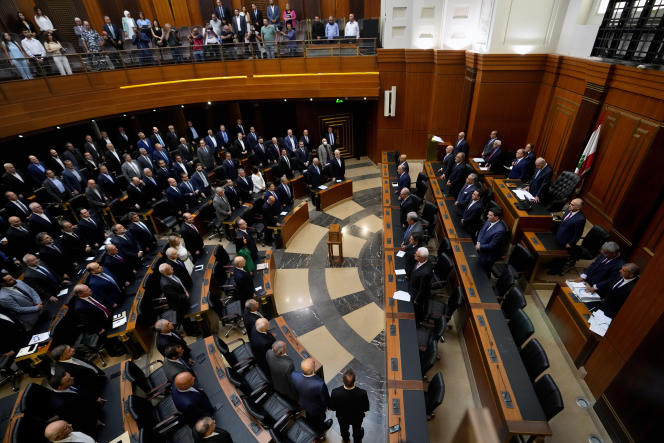The political deadlock remains intact in Lebanon between the Shiite Hezbollah movement and its opponents. Wednesday, June 14, the 128 deputies of the country of the Cedars again failed to elect a president. This electoral session – the twelfth organized since the departure of the outgoing president, General Michel Aoun, at the end of October 2022 – will nevertheless have had the merit of allowing each camp to count its forces.
Faced with the candidate supported by Hezbollah and the Shiite Amal party, the former minister and leader of the Marada party, Sleiman Frangié, the opposition was, for the first time, united around a single candidate: Jihad Azour, a former minister Finance became a senior official at the International Monetary Fund (IMF).
In the first ballot, neither of the two candidates obtained the qualified majority of 86 votes which allows them to win this post, traditionally reserved for a Maronite Christian. With 59 votes, Jihad Azour came out on top against Sleiman Frangié, who garnered 51 votes. Although no candidate was guaranteed to win in the second round, where a simple majority of 65 votes is required, Mr. Frangié’s supporters left the Chamber to cause a lack of quorum. “What happened today is a real uprising of Lebanese MPs (…) who said no to diktats and threats”greeted the Christian MP Samy Gemayel, leader of the Kataeb party, considering that the agreement reached around Mr. Azour was a clear message sent to Hezbollah.
It is indeed a setback for the powerful armed movement and the Amal party who see their hegemony over Lebanese political life challenged by this alliance. For several months, the Shiite tandem has been trying to impose Sleiman Frangié, a long-time ally and close friend of Syrian President Bashar Al-Assad. The game could seem acquired to them in the face of the inability of their detractors to propose an alternative. The candidacy of Mr. Frangié was even promoted behind the scenes by Paris which, in the name of pragmatism, thought to convince the other Lebanese parties to accept a ticket associating this figure of the establishment with a reforming prime minister.
Intimidation and threats
These pressures had the effect of uniting the opposition, rallied by the Free Patriotic Movement (CPL), the Christian party founded by Michel Aoun. The volte-face by Gebran Bassil, the leader of the CPL, deprived the Shiite tandem of the Christian cover it had had since the alliance sealed between these two camps in 2006 to bring General Aoun to power. Jihad Azour, however, is not unanimous among the Christian, Druze and Sunni deputies who rallied to the opposition, because of his move to finance under the government of Fouad Siniora (2005-2009). Some supported him in the name of compromise, others preferred to slip in other names, including that of former minister Ziyad Baroud.
You have 40.92% of this article left to read. The following is for subscribers only.
